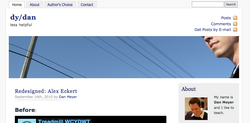
Students could skype students around the world, or professors from major universities specializing in particular areas of history, scour the internet for historians blogs and primary resources, then test their data against their hypothesis. Maybe they were right, maybe they were wrong. Either way students have complete ownership of this academic journey. From observation, to asking the question, to solving the question. Students can take days, or weeks to solve one major question; and along the way....accidental learning will take place. Students will be exposed to research tangents that pull in information, create connections with others, and hone their critical thinking skills. All of this is possible if you model patience with your students. Dan Meyer talks about how textbooks create problems that mirror contemporary sit-coms. Everything can be solved in a 1/2 hour. Only problem is that the world doesn't work that way. As Dan says, have you ever seen a problem worth solving that can be accomplished in a 1/2 hour?" (I'm paraphrasing here) Take a second and watch his presentation and then please leave a comment expressing your opinions. Just think, maybe answering 4 or 5 big questions in an entire school year will provide a better education than weekly assessments and a yearly 40 question standardized test.
-Mike
 RSS Feed
RSS Feed


